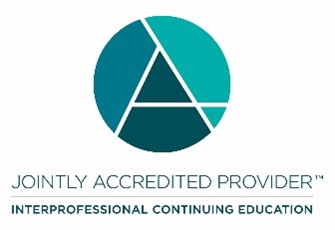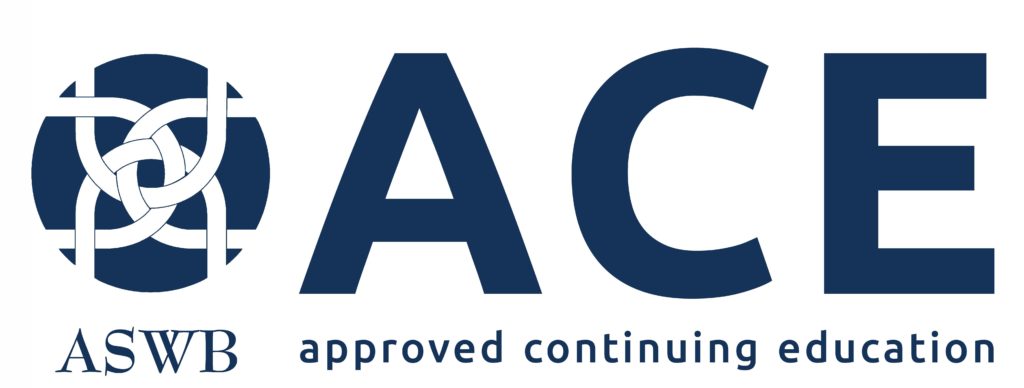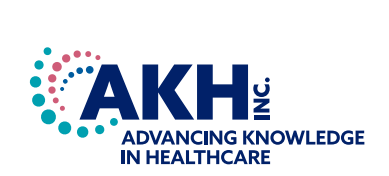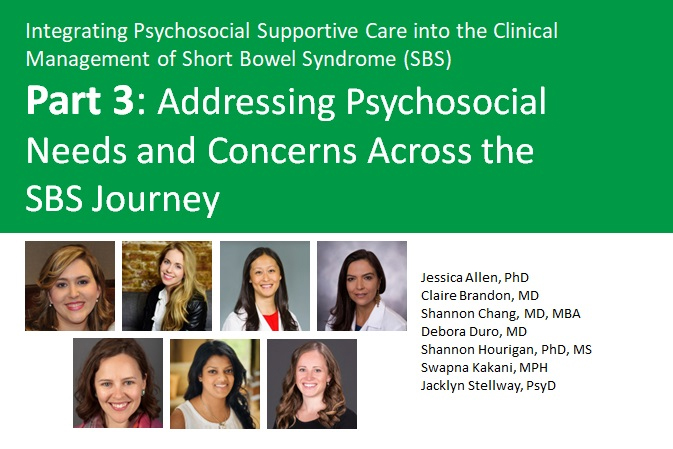Release date: June 30, 2022
Expiration date: June 30, 2023
Activity Overview
Short bowel syndrome (SBS) is a chronic condition that may affect infants, children, adolescents, and adults. SBS occurs when the body is unable to absorb enough nutrients from food because the person does not have enough small intestine. Many patients with SBS and their family members experience significant psychosocial distress that is attributable to this chronic condition. Patients with SBS have significantly lower quality of life (QoL) compared to the general population and some examples of psychosocial distress include sleep disruptions, low energy, depression, anxiety, financial stress, and reduced social interactions.
Target Audience
This activity is intended for psychiatrists, psychologists, and social workers who may be involved in the care of patients with SBS.
Learning Objectives
Upon completion of this activity, the learner should be able to:
- Describe the unique psychosocial needs among patients with SBS and their family members
- List the reasons why patients with SBS and their family members are at risk for developing significant psychosocial distress
- Explain the common types of psychosocial distress experienced by patients with SBS and their family members
- Identify effective strategies for assessing and managing different types of psychosocial distress among patients with SBS and their family members
- Outline ways to coordinate psychosocial care for patients with SBS across their treatment journey
- List ways to employ team-based care coordination strategies for patients with SBS and their family members
Instructions for Participation and Credit
There is no fee to participate in this activity. Statements of credit will be awarded based on the participant’s attendance. A statement of credit will be available upon completion of an online evaluation/claim credit form. The link to the online evaluation/claim credit form will be provided once the webinar has concluded.
If you have questions about this CE activity, please contact AKH Inc at [email protected].
CE Credit provided by AKH Inc., Advancing Knowledge in Healthcare

In support of improving patient care, this activity has been planned and implemented by AKH Inc., Advancing Knowledge in Healthcare and Q Synthesis LLC. Advancing Knowledge in Healthcare is jointly accredited by the Accreditation Council for Continuing Medical Education (ACCME), the Accreditation Council for Pharmacy Education (ACPE), and the American Nurses Credentialing Center (ANCC), to provide continuing education for the healthcare team.
Physicians
AKH Inc., Advancing Knowledge in Healthcare designates this enduring material for a maximum of 1.0 AMA PRA Category 1 Credit(s)™. Physicians should claim only the credit commensurate with the extent of their participation in the activity.

Psychologists
Continuing Education (CE) credits for psychologists are provided through the co-sponsorship of the American Psychological Association (APA) Office of Continuing Education in Psychology (CEP). The APA CEP Office maintains responsibly for the content of the programs.

Social Workers
As a Jointly Accredited Organization, AKH Inc., Advancing Knowledge in Healthcare is approved to offer social work continuing education by the Association of Social Work Boards (ASWB) Approved Continuing Education (ACE) program. Organizations, not individual courses, are approved under this program. State and provincial regulatory boards have the final authority to determine whether an individual course may be accepted for continuing education credit. AKH Inc. Advancing Knowledge in Healthcare maintains responsibility for this course. Social workers completing this course receive 1.0 continuing education credits.
Faculty
Jessica Allen, PhD
Assistant Professor of Psychology
Birmingham-Southern College
Birmingham, AL
Claire Brandon, MD
Founder, CEO, Psychiatrist
Whole Body Psychiatry
New York City, NY
Shannon Chang, MD, MBA
Associate Professor of Medicine, Gastroenterologist
Director of Clinical Operations, Inflammatory Bowel Disease Center
NYU Langone Health
New York City, NY
Debora Duro, MD
Program Director, Pediatric GI Nutrition
Broward Health
Fort Lauderdale, FL
Shannon Hourigan, PhD, MS
Staff Psychologist
Boston Children’s Hospital
Boston, MA
Swapna Kakani, MPH
SBS Patient & Healthcare Advocate
Jacklyn Stellway, PsyD
Assistant Professor, Department of Pediatrics
Oregon Health & Science University
Portland, OR
Disclosures
It is the policy of AKH Inc. to ensure independence, balance, objectivity, scientific rigor, and integrity in all of its continuing education activities. The author must disclose to the participants any significant relationships with ineligible companies whose products or devices may be mentioned in the activity or with the commercial supporter of this continuing education activity. Identified conflicts of interest are mitigated by AKH prior to accreditation of the activity. AKH planners and reviewers have no relevant financial relationships to disclose.
Jessica Allen, PhD has the following relationships to disclose:
Advisory Board – Takeda Pharmaceutical Company
Claire Brandon, MD has no financial relationships to disclose.
Shannon Chang, MD, MBA has the following relationships to disclose:
Consultant – Abbvie, Pfizer, Bristol Myers Squibb
Debora Duro, MD has no financial relationships to disclose.
Shannon Hourigan, PhD, MS has no financial relationships to disclose.
Swapna Kakani, MPH has the following relationships to disclose:
Consultant – Vectiv Bio
Speaker – Takeda Pharmaceutical Company, Vectiv Bio, Atara Bio
Jacklyn Stellway, PsyD has no financial relationships to disclose.
Staff/Reviewers
Joseph Kim, MD, Q Synthesis, LLC, President has no financial relationships to disclose.
Dorothy Caputo, MA, BSN, RN, Senior Director of Continuing Education & Compliance has no financial relationships to disclose.
Broc Pollinger MSW, LSW, OSW-C, Reviewer has no financial relationships to disclose.
All of the relevant financial relationships listed for these individuals have been mitigated.
Disclosure of Unlabeled Use and Investigational Product
This educational activity may include discussion of uses of agents that are investigational and/or unapproved by the FDA. Please refer to the official prescribing information for each product for discussion of approved indications, contraindications, and warnings.
Disclaimer
This course is designed solely to provide the healthcare professional with information to assist in his/her practice and professional development and is not to be considered a diagnostic tool to replace professional advice or treatment. The course serves as a general guide to the healthcare professional, and therefore, cannot be considered as giving legal, nursing, medical, or other professional advice in specific cases. AKH Inc. specifically disclaim responsibility for any adverse consequences resulting directly or indirectly from information in the course, for undetected error, or through participant’s misunderstanding of the content.
Commercial Support
This activity is supported by an educational grant from Takeda Pharmaceuticals U.S.A., Inc.
This program is jointly provided by AKH Inc., Advancing Knowledge in Healthcare and Q Synthesis LLC.


Copyright 2022 Q Synthesis LLC No part of this publication may be produced, stored in a retrieval system, or transmitted in any form or by any means, electronic, mechanical photocopying, recording, or otherwise, without the prior permission of the publisher.


